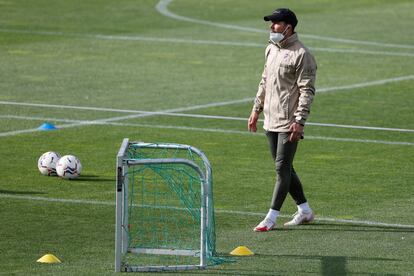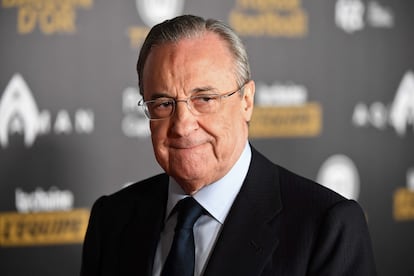Atlético de Madrid becomes first Spanish club to pull out of new European Super League
All six of the English teams that had signed up to the controversial breakaway competition have also announced that they will no longer be participating


Atlético de Madrid soccer club has announced that it is pulling out of the new European Super League, a controversial breakaway competition that was announced this past weekend. Atlético is the first of the three Spanish clubs involved to do so. The other teams from Spain involved are Real Madrid and FC Barcelona.
“The board of directors at Atlético de Madrid, which met on Wednesday morning, has decided to formally communicate to the Super League and the rest of the founding clubs its decision to not formally join the project,” a statement from the club read. “Atlético de Madrid took the decision last Monday to join the project based on circumstances that are not applicable today. For the club, mutual understanding between all of the collectives that make up the rojiblanca family is essential, especially our fans. The first team’s squad and its coach have expressed their satisfaction about the decision taken by the club, on the understanding that sporting merit should take precedence over any other criteria.”
Only three Spanish clubs – Real Madrid, Barcelona and Atlético de Madrid – and two Italian clubs – Juventus and AC Milan – have not pulled out
The news came today after the six English clubs that had signed up to the new league – Manchester United, Liverpool, Chelsea, Manchester City, Arsenal and Tottenham Hotspur – announced that they were pulling out. The Italian team Inter Milan also announced on Wednesday that it would no longer be a part of the competition. This leaves the three Spanish clubs – Real Madrid, Barcelona and Atlético de Madrid – and the two Italian clubs – Juventus and AC Milan – still standing.
Andrea Agnelli, the chairman of Juventus and one of the vice-presidents of the new European Super League, admitted after the news of the English clubs’ departure broke that the project was done and dusted. “To be sincere and honest, the Super League will not be able to happen,” he said, when asked about the latest developments. “I’m still convinced about the beauty of the project, but we have to admit that it will not be able to go ahead now,” he continued.
Late last night, the Super League issued a statement insisting that it “is convinced that the current status quo of European football needs to change. We are proposing a new European competition because the existing system does not work. Our proposal is aimed at allowing the sport to evolve while generating resources and stability for the full football pyramid, including helping to overcome the financial difficulties experienced by the entire football community as a result of the pandemic.

“It would also provide materially enhanced solidarity payments to all football stakeholders. Despite the announced departure of the English clubs, forced to take such decisions due to the pressure put on them, we are convinced our proposal is fully aligned with European law and regulations as was demonstrated today by a court decision to protect the Super League from third party actions.” This was a reference to a ruling by a judge in Madrid on Tuesday in a commercial court that found that soccer’s international governing body FIFA and the Union of European Football Associations (UEFA) could not take action against the new league. The Madrid court ruled in favor of the protective order presented by the European Super League Company, which represents the 12 clubs behind the new league. In his ruling, Judge Manuell Ruiz de Lara banned FIFA and the UEFA from taking any measure against the clubs, players and leaders of the Super League, such as sanctioning players or expelling them from their national teams.
“Given the current circumstances,” the Super League statement continued, “we shall reconsider the most appropriate steps to reshape the project, always having in mind our goals of offering fans the best experience possible while enhancing solidarity payments for the entire football community.”
The new league has been spearheaded by the president of the Real Madrid soccer club, Florentino Pérez. After the negative reaction of politicians, fans and players alike, Pérez took to the Spanish airwaves on Monday night to explain the reasons behind the idea, painting an apocalyptic panorama for the sport during his interview on the TV show El Chiringuito.
“We are doing this to save soccer, which is going through a critical time and is close to ruin,” he argued during the show. “The situation is dire. For some time now people have been losing interest. Audiences and audiovisual rights are falling and something had to be done. Soccer is in freefall. If we don’t do something, it won’t last for long. It needs to evolve, as life, people and companies all do. It has to adapt to the times.”
We are doing this to save soccer, which is going through a critical time and is close to ruinFlorentino Pérez, president of the Real Madrid soccer club
On Tuesday night, however, the Real Madrid president failed to show for another interview on radio show El Larguero, given that he was taking part in an emergency meeting about the future of the league.
The proposal of the European Super League was for the 12 founding teams – Manchester United, Liverpool, Chelsea, Manchester City, Arsenal and Tottenham Hotspur from the UK, Real Madrid, Barcelona and Atlético de Madrid from Spain, and Juventus, AC Milan and Inter Milan from Italy – to play midweek games, along with three guest clubs (PSG, Bayern Munich and Borussia Dortmund were in the frame). Another five teams would be able to classify each year or would be invited to participate.
The 20 teams would be divided into two groups of 10, with home and away games. The three top teams in each group would move onto a knock-out stage from the quarterfinals onward, also with home and away games played. A total of 197 games would be scheduled, and the final would be held at the weekend. The competition was slated to begin in August 2022.
The league was designed to rival the Champions League, which is run by soccer’s European governing body, UEFA. In fact, the battle over the new competition was unleashed just hours before UEFA was due to present its new model for the Champions League, with more games and more clashes between the biggest teams planned.
Both UEFA and FIFA, the world governing body, expressed their displeasure about the plan. “The Super League is a spit in the face of football and our society,” UEFA president Aleksander Ceferin said on Monday. FIFA president Gianni Infantino said he “strongly disapproves” of the plan, the BBC reported.
A statement from Spain’s top-flight league LaLiga, released on Monday, called the competition “secessionist and elitist,” and said that it “attacks the principles of open competition and sporting merit.” It added that it was a “selfish plan that is designed to make the richest even richer.”
English version by Simon Hunter.
Tu suscripción se está usando en otro dispositivo
¿Quieres añadir otro usuario a tu suscripción?
Si continúas leyendo en este dispositivo, no se podrá leer en el otro.
FlechaTu suscripción se está usando en otro dispositivo y solo puedes acceder a EL PAÍS desde un dispositivo a la vez.
Si quieres compartir tu cuenta, cambia tu suscripción a la modalidad Premium, así podrás añadir otro usuario. Cada uno accederá con su propia cuenta de email, lo que os permitirá personalizar vuestra experiencia en EL PAÍS.
¿Tienes una suscripción de empresa? Accede aquí para contratar más cuentas.
En el caso de no saber quién está usando tu cuenta, te recomendamos cambiar tu contraseña aquí.
Si decides continuar compartiendo tu cuenta, este mensaje se mostrará en tu dispositivo y en el de la otra persona que está usando tu cuenta de forma indefinida, afectando a tu experiencia de lectura. Puedes consultar aquí los términos y condiciones de la suscripción digital.








































